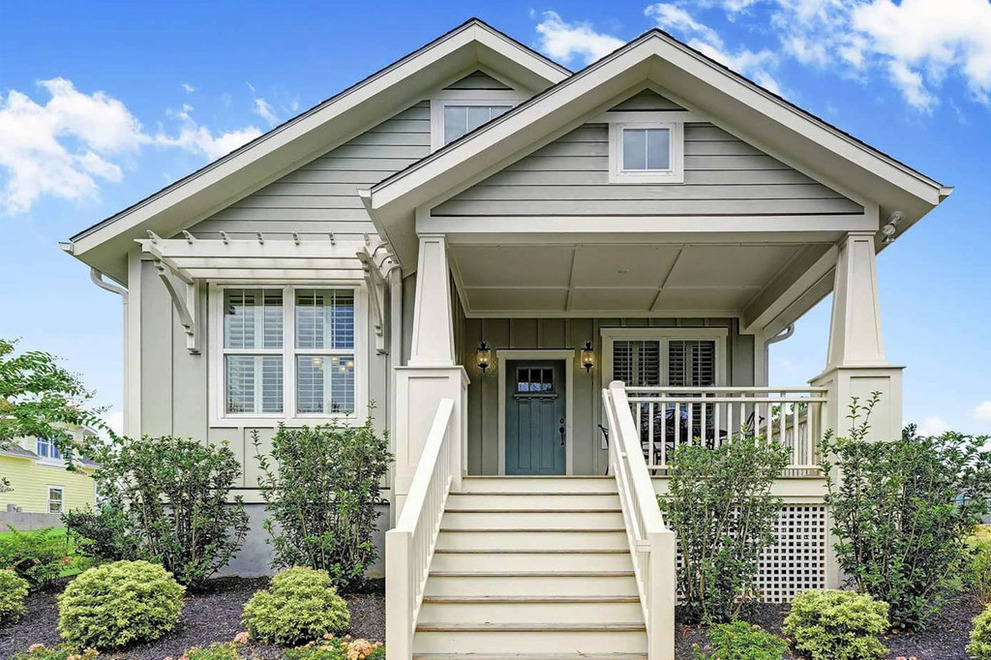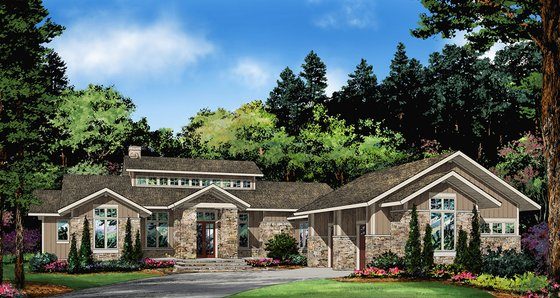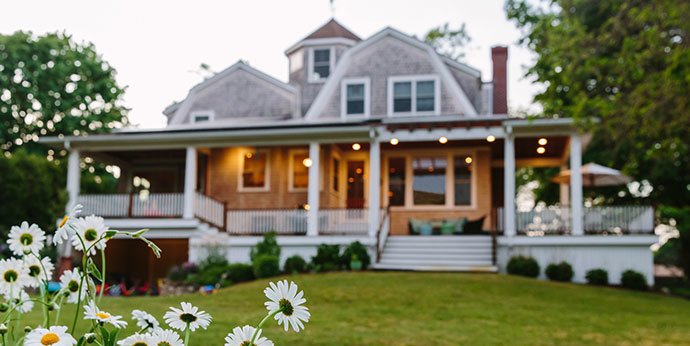How to Pick the Right Builder
The most important decision you make when building a new home – besides picking the ideal house plan – is selecting your builder. Nothing can make or break the experience like the builder you choose. Some people spend years cursing a builder who cut corners or cost them a fortune. But many people feel like they’ve made an important friend for life. Here’s some advice that will increase your odds of a happy ending.
Get Your House in Order
Eventually, you will ask three or four builders to give you construction bids. But before you can do that, you need to understand the scope of the project. Many plans come with material lists and structural framing plans that builders will use to make estimates. If you don’t have them, you could have a building material dealer or engineer create a material list from the blueprints; that way you’ll be comparing apples to apples in bids. Even so, most plans do not include an HVAC or electrical plan. Separate subcontractors must be hired to do that work, either by you or the builder.
Find a Custom Builder
For a house plan project, you probably don’t want to hire a production builder who primarily builds homes of the same design over and over again. Instead, you want a builder who can build from architectural plans, which is a different skill set. A good custom builder hews closely to the designer’s intent, fill in missing details with a similar aesthetic. A bad builder will go off book whenever possible, looking for opportunities to substitute less-expensive material and design details with which he’s most familiar. A builder’s design sensitivity is especially important because house plans don’t specify finish materials such as paint and carpeting.
Consider Hiring a Builder Early in the Process
Building a house from a plan requires a lot of time and expertise. Some people hire a builder before they even buy a house plan. That way they can use the builder’s expertise to review potential plans for the cost of construction. They may even have the builder run interference with the building department and the bank. They ask the builder to work with an engineer to get the plans stamped for approval. This kind of assistance is rarely free. And if you begin working with a builder before you select a house plan, it may be difficult to get the sharpest construction bid.
Do Some Internet Research
Most builders these days have a web site to showcase their work. They are worth checking out. Make sure they build in a style that’s right for the design of your home. The builder of traditional homes may not have the expertise or sensibility to build a contemporary home that highlights rather than hides construction details. While you are on your computer, check to see whether customers have registered complaints against builders in chat boards. The most common complaints, of course, will be that the builder went over-budget, didn’t build the house as designed, failed to fix his mistakes, and didn’t come back in a timely basis to finish

Before Meeting a Custom Builder, Do These Things
After weeks of research, you’ve finally narrowed your list of potential home builders. The next step? Meet with the candidates you’ve chosen. The builder you choose will become your partner for the next year, so it is important to pick someone you trust who has the right qualifications.
Research local builders.
Refine your builder list. Before you meet with a builder, be sure to view their online portfolio and drive by some of their houses. See what you like and what you don’t like about their work. Have they built homes that are similar in size and style to what you want? How do their homes look after 10+ years? Ask the builder details about a specific project (e.g., time, costs, challenges, things they do differently) and be prepared to point out features you want incorporated in your home.
Ask questions.
Meeting with a builder for the first time can be an overwhelming experience
Show and tell.
If you’ve been surfing Houzz for inspiration, this is a great time to show the builder what you’ve found. Bringing actual visuals of what you want in your home will help your builder and designer get a sense of what details you want early in the process. The process of sharing visuals will also help determine if the builder is capable of sharing your vision
Ask for references.
Every established builder will be able to provide references from past clients. Several weeks before the meeting, ask for at least three references — aim for one old and two new — and be sure to check them. Ask these customers about the home’s durability as well as the builder’s communication methods, response times, and ability to provide realistic estimates and stay within budget.

Tips for Choosing and Working With a Builder
You may have heard horror stories about problems with builders, budgets spiraling out of control and sites left half-finished. But the reality is that the vast majority of builders are both professional and capable, and you can do a great deal to avoid bad experiences simply through the way you choose, manage and communicate with them. Here’s why it’s worth laying the foundations for a good relationship with your builder – and how to do it well.
Don’t approach a builder too soon
It may seem logical if you’re thinking of having construction work done to start by approaching a builder, but don’t be too hasty. Builders are generally good at pricing once they know exactly what’s wanted, but asking for a price before you have any drawings or detailed information about the project is as good as inviting them to tell you simply what they think you want to hear.
Consider the scope of the project
Find the right kind of building company for your project. The kind of contractor suitable for a luxury retail project has to be highly organised, usually with multiple managers, a well-organised back office, and teams that can operate around the clock and produce exceptionally high-quality work at speed. Such contractors tend to be expensive and for most people would be too much for a kitchen addition or an attic conversion
Establish whether you need a specialist or just a general builder
A really good general builder is suitable unless the work in question is unusual. For example, a good general builder is perfectly capable of converting an attic or building out of a basement. You can, of course, go to a loft or basement company, and they too may do a great job. The most important thing is to find someone who will do good work for the right price.
Aim for one point of responsibility
Rather than using one general contractor, it may seem wise to try to save money by directly engaging separate tradespeople, such as plasterers, electricians and carpenters. While it’s true that a general contractor will take a small slice of cost from the subcontractors, I would argue that this money is well-earned. Managing and coordinating the separate trades on-site takes a great deal of mettle and experience.

Selecting a Quality Custom Home Builder: What You Need to Know
The success of your new home project depends largely on choosing a quality custom builder. Selecting the right builder is just as important as choosing the location and design of your new home. Above anything else, you should focus on quality and value over affordability.
High Quality Lumber
Many builders rely on dimensional lumber for framing due to the inexpensive costs associated with the material. Dimensional lumber is milled from soft woods such as spruce and pine and has varying degrees of stability. The majority of dimensional lumber used for custom home projects come from young trees undermining the stability of the wood. Environmental factors can also impact the stability of dimensional lumber. High moisture areas, like coastal homes, can experience issues when a home is framed with dimensional lumber. The fluctuating moisture content could cause the lumber to twist, bow, shrink, and expand.
Strong and Durable Subflooring
A quality custom homebuilder will also make distinct choices about what type of subflooring to include in your new home. Plywood and engineered subflooring have clear compositional differences. Plywood is constructed from glued strips of wood veneer while engineered subfloors use polyurethane bonding for extra protection and durability.
Beneficial Sheathing
When you have a home built, you want to develop a partnership with a builder who aims to build the most energy efficient home possible while keeping your residence protected from the elements. Zip Board Sheathing was developed through Huber Engineered Woods as an alternative to plywood and OSB systems. Zip Board has proven to have an enhanced level of durability when compared to other systems. The moisture barrier associated with Zip Board protects the structure from early construction phase and on. Joints are tightly sealed to prevent moisture exposure over the homes’ lifetime. Air transfer is also blocked, air exchange is the greatest cause of home energy loss, as a way to improve total home efficiency and indoor air quality.
Better Home Siding Choices
During the 1960s, vinyl siding was developed as an alternative to inexpensive and dent-prone aluminum siding. However, vinyl siding is vulnerable to certain issues like cracks and breaks especially in poor weather conditions such as extreme cold and high wind. Builders who use James Hardie siding choose a more beautiful type of siding constructed from fiber cement, which will protect your new home for years to come. James Hardie siding is five times thicker than traditional vinyl siding, making it highly resistant to wind, snow, hail, and extreme temperatures. Vinyl siding is flammable and this could become problematic if you have grills or outdoor fireplaces near the exterior of the home. James Hardie siding has high heat resistance and also will not sag or wrinkle from sun exposure. Compared to vinyl siding, James Hardie sidings color will fade 20 percent less.
How to Choose Your Home Builder
If you are in the market for a new home, you should shop for your builder as carefully as you shop for your home. Whether you are buying a condo, a townhouse, a house in a subdivision, or a custom-built house, you want to know that you are buying a good quality home from a reputable builder.
Do Your Homework
Once you have a list of builders who are building the type and price range home you are interested in, research their reputation and the quality of their work. You should begin by contacting your local Better Business Bureau. They can provide you with specific information on any unsettled complaints. Also, you should ask the builders on your list for the addresses of their recently completed houses so you can talk with the homeowners. Drive by on a Saturday morning when home owners may be outside doing chores or errands. Introduce yourself and say you are considering buying a home from the builder who built their home. Talk to several owners, and try to get a random sample of opinions.
Why Should You Choose a Builder Association Member?
Members of the Builders Association, are part of a nationwide partnership with more than 800 state and local associations whose mission is to enhance the climate for housing and the building industry and to promote policies that will keep housing a national priority.
Choosing a Contractor Do’s and Don’ts
For those of you worried about choosing a general contractor to build your new home, feel confident in knowing that most custom home contractors are reliable, honest individuals. The very few who are not, have created an image well beyond their real numbers. To help you find the right GC for your new home